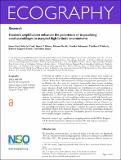Transient amplification enhances the persistence of tropicalising coral assemblages in marginal high-latitude environments
Abstract
Predicting the viability of species exposed to increasing climatic stress requires an appreciation for the mechanisms underpinning the success or failure of marginal populations. Rather than traditional metrics of long-term population performance, here we illustrate that short-term (i.e. transient) demographic characteristics, including measures of resistance, recovery and compensation, are fundamental in the poleward range expansion of hard corals, facilitating the establishment of coral populations at higher latitudes. Through the annual census of subtropical and temperate Acropora spp. colonies in Japan between 2017 and 2019, we show how enhanced transient amplification (i.e. short-term increases in population growth following disturbance) supports the persistence of coral assemblages within more variable high-latitude environments. The transient dynamics of both the subtropical and temperate assemblages were strongly influenced by their corresponding recruitment patterns. However, we demonstrate that variation in colony survival and fragmentation patterns between the two assemblages determines their relative capacities for transient amplification. This latitudinal variation in the transient dynamics of Acropora spp. assemblages emphasizes that coral populations can possess the demographic plasticity necessary for exploiting more variable, marginal conditions.
Citation
Cant , J , Cook , K M , Reimer , J D , Mezaki , T , Nakamura , M , O'Flaherty , C , Salguero-Gómez , R & Beger , M 2022 , ' Transient amplification enhances the persistence of tropicalising coral assemblages in marginal high-latitude environments ' , Ecography , vol. 2022 , no. 10 , e06156 . https://doi.org/10.1111/ecog.06156
Publication
Ecography
Status
Peer reviewed
ISSN
0906-7590Type
Journal article
Description
Funding: JC was awarded a Natural Environment Research Council (NERC) Doctoral Training Programme Scholarship. Grants were made by the British Ecological Society, UK; the Winifred Violet Scott Estate, Australia; and the European Union's Horizon 2020 research and innovation programme under the Marie Skłodowska‐Curie grant agreement TRIM‐DLV‐747102 to MB. ORCHIDS project funding from the University of the Ryukyus was made to JDR. Recruitment surveys were supported by JSPS KAKENHI grant no. 16K07527 to MN. RS‐G was supported by a NERC Independent Research Grant (no. NE/M018458/1).Collections
Items in the St Andrews Research Repository are protected by copyright, with all rights reserved, unless otherwise indicated.

